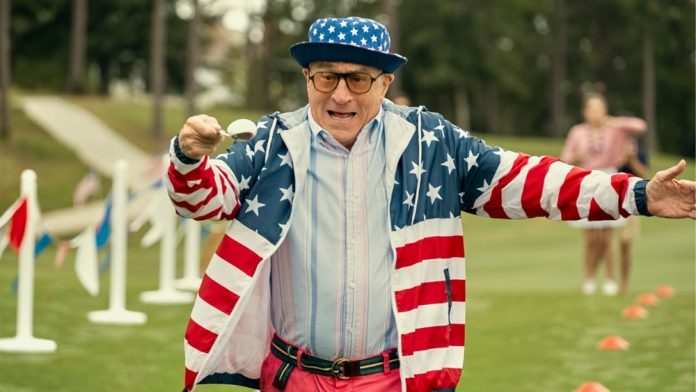Lionsgate’s new comedy About My Father is as close as you can get to a real family portrait of comedian Sebastian Maniscalco, who co-wrote the script with Austen Earl.
Now playing in theaters, the film tells the story of two families from completely different backgrounds who come together over a Fourth of July weekend for the sake of their soon-to-be-engaged children. Maniscalco plays the Italian groom, who comes from a working-class way of life that goes back generations. Leslie Bibb plays the bride, Ellie, whose uber-wealthy WASPy parents enjoy a pampered, nouveau riche lifestyle. Can the groom’s modest immigrant hairdresser father, Salvo (Robert De Niro), who brought the family from Sicily to Chicago in pursuit of a better life, put aside his cultural differences with Ellie’s eccentric family for the sake of his son’s happiness? You might be surprised…
Helming this humorous and heartfelt dramedy is director Laura Terruso, who at first seems like a curious choice to direct De Niro, who has worked with legends known solely by their last names — Scorsese, Coppola, DePalma, Bertolucci, Tarantino, etc. Brooklyn-born Terruso, who connected personally with the film’s Sicilian heritage, held her own, becoming the fourth woman and the youngest to have ever directed De Niro in a live-action film over his 60-year career, joining Nancy Meyers, Penny Marshall, and Agnès Varda.
Prior to this dubious distinction, her resume included Work It (Max), an episode of Dickinson (Apple TV+), the indie comedy Hello, My Name Is Doris, which she co-produced and co-wrote alongside director Michael Showalter, and the indie movie Fits and Starts, which marked her feature debut as a writer-director.
Above the Line spoke with Laura Terruso via Zoom video from her home in Los Angeles. Down to earth and easy to chat with, it’s evident how she was able to disarm such a big star, addressing the elephant-in-the-room question about how she got to direct a legend like Robert De Niro, whom she now calls “Bob.”
She also talked about the surreal moments she experienced on set, like when she introduced her Sicilian mother to the Oscar-winning actor, and the importance of food and family when it comes to Italians — a group that she’s proud to count herself among. Finally, she discussed consulting Maniscalco’s father, Salvo, and wife, Lana Gomez, about portraying them on screen, and shooting a laugh-out-loud scene in which Maniscalco is caught in a compromising position while Hydroflighting.
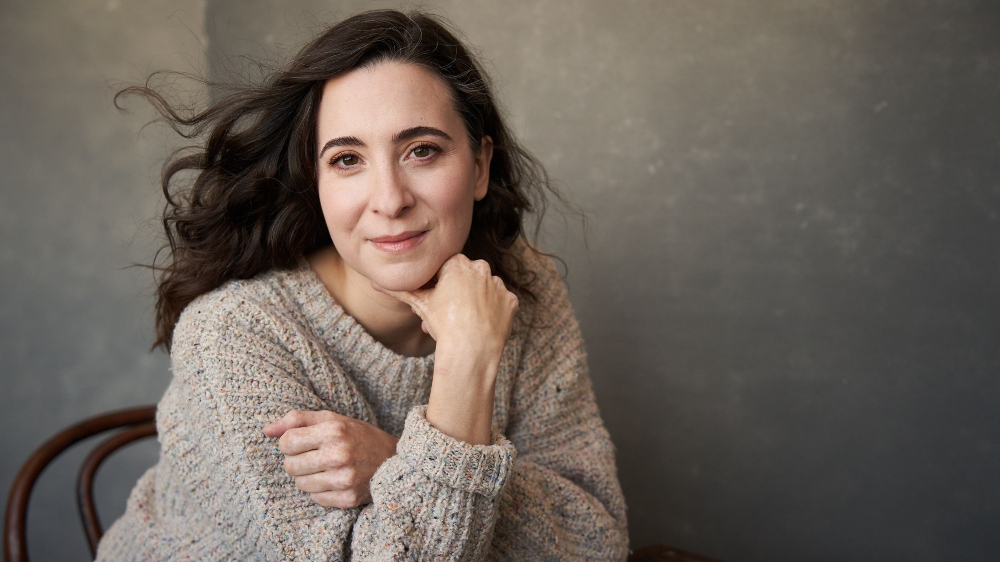
Above the Line: Tell me about how you first got involved with this film.
Laura Terruso: I was finishing a film for Netflix called Work It, which was a team dance movie. My agent sent me the screenplay for About My Father and said, ‘You’re Italian; check this out.’ [laughs] I read it and I was like, “Whoa!” It’s the first time in my career that I read a script and felt like I had to direct this movie because it’s about Sebastian Maniscalco’s relationship with his Sicilian immigrant father. And I grew up with a Sicilian immigrant mother, and so immediately, I just felt so connected to the world, the characters, [and] the material, and I pursued it doggedly.
ATL: What was your pitch, so to speak?
Terruso: I knew [producer] Andrew Miano from [production company] Depth of Field. They had sent me another script that I didn’t respond to. So I reached out to him and said, ‘I love this project. I really want this.’ And he was like, ‘Well, you know, we’ve got a lot of big directors in the mix.’ I found out later that it was, like, me up against, probably, five old white guys [laughs].
I put together a really, really thorough presentation, first talking about my personal connection to the material, and then going into just how I saw the film, from how I work with actors [and] the point of view of the film to how I would shoot the film to the set design and production design. I really walked everyone through my vision for this movie.
Sebastian, thankfully, was really impressed, and that’s how I got the job. Sebastian and his manager, Judi Marmel, are an incredible force. She’s a producer on the film, and I remember after the pitch, which was like a 45-minute presentation, she was like, ‘Finally, someone who wants a job!’ I said, ‘Judi, I don’t want a job. I want this job.’ It was so deeply personal to me, and I knew that I could bring something special to it.
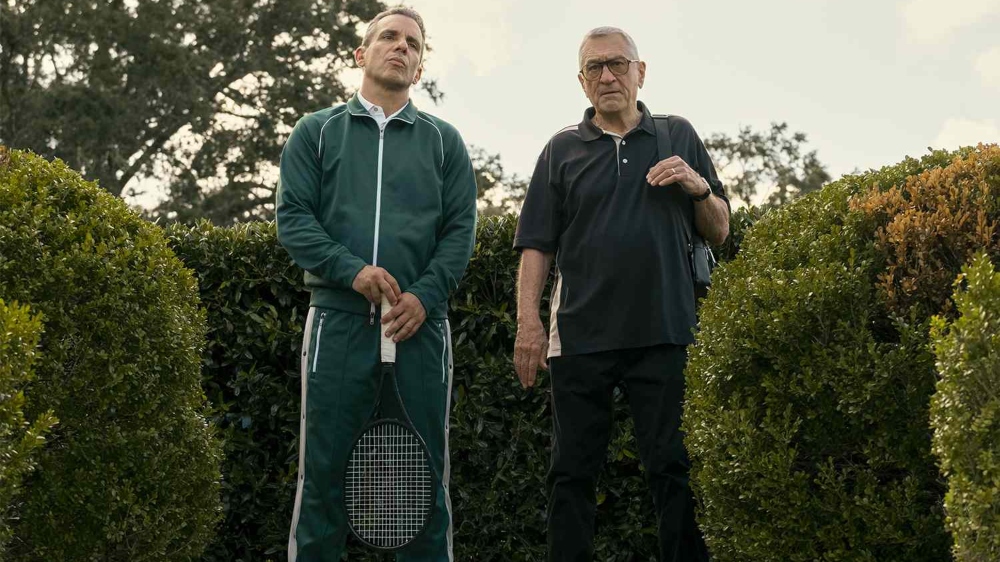
ATL: Well, you surely did. So how surreal did it feel working with Robert De Niro?
Terruso: Thankfully, and I think to Bob’s credit, he was involved very early on. I got the job in August, and then the first actor we sent the script to was, of course, Robert De Niro, and two days later I got a text from my agent saying, ‘You have a Zoom with Robert De Niro tomorrow!’ I geared up for this Zoom. I was like, ‘This is going to be huge,’ and so I put on “Eye of the Tiger” and danced around my house! Then I got a text, and they were like, ‘Bob needs to push the meeting [to] tomorrow.’
Then I dance around the house the next day, and it’s like, ‘Bob needs 15 more minutes!’ I dance around my house, get on Zoom with him, and he’s so laid-back. He’s so relaxed; he puts you at ease immediately. I just basically walked him through the presentation that I walked Sebastian, Judi, and the Depth of Field guys through — this is my vision for the film, [and] this is my connection to it.
ATL: Can you elaborate when you say De Niro was really involved early on?
Terruso: After our Zoom, he said, ‘Okay, let’s do a reading.’ This was in September of 2020, during lockdown. I thought, “Well if I’m going to get on a plane for anyone, it’s going to be Robert De Niro!” So we all got on a plane — Sebastian, me, and Andrew — and we went to New York, where we had a table read. It was a socially distanced table read at Bob’s offices in Tribeca. Just seeing Sebastian read with Bob, I knew we had a movie. They had obvious chemistry. They looked like father and son. Bob clearly understood the humor of this movie. He was clearly going to bring so much to it.
After that meeting, we sat down and talked, [and] Bob signed on. From then on, I worked really closely with him. You know, when you work with an actor at that level, they’re involved in the whole filmmaking process. They’re involved in the casting; they want to see the locations. It’s a holistic approach. They know that movies are more than just their performances, you know?
Bob has directed and is a director, so he was very involved as I was prepping. I would be like, ‘This house looks great. These are the actors we’re thinking of.’ Bob was like, ‘Everybody reads, and that’s how we do this because we need to know that the chemistry is there.’ It was a real blessing to get to work with him on this film.
ATL: Oh, I bet. Can you break down his specific input with the character Salvo? For instance, was it his idea to do the ponytail?
Terruso: [laughs] All of that came from Sebastian’s actual life, as did so much of the film and the storytelling. I think that’s what makes it so special, and that’s what attracted me to it. What attracted Bob to it is that it’s all pulled from his real life, and a lot of the comedy is coming straight from his stand-up. I scoured his Instagram and looked at all his backstories and saw that image of him in the Christmas tree costume and was like, ‘This is going in the movie. This is hilarious.’
There are so many things from his real life that we pulled from. So, growing up, his dad actually had a ponytail, and that was how he looked. I mean, we pulled images of his dad in the ’80s, and that was the reference. When you work with an actor like De Niro, there’s such a commitment to authenticity, and because this was a story that was based on something true, there was the actual truth to pull from that, which is so important.
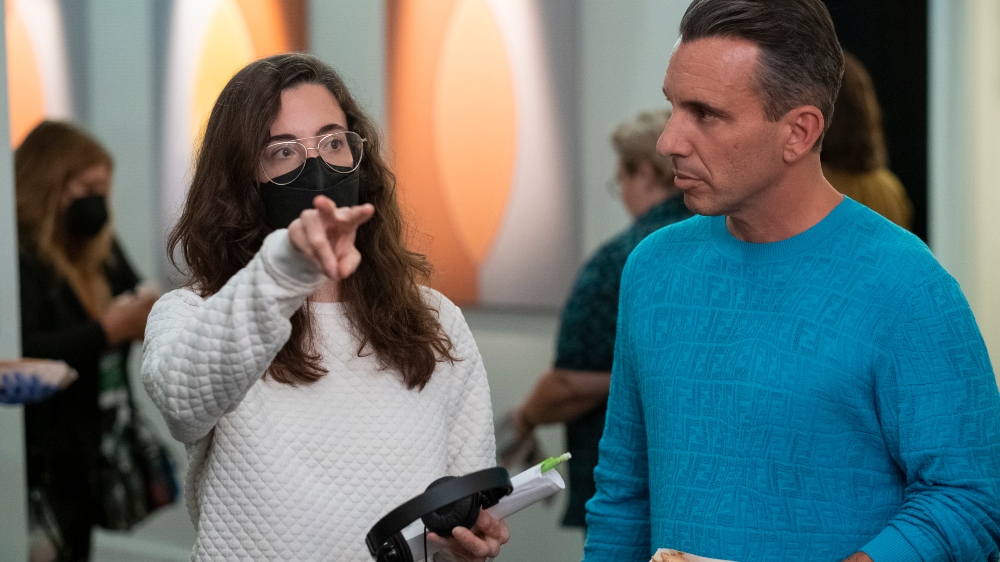
ATL: I imagine Bob — now I’m calling him Bob — met with Sebastian’s dad.
Terruso: Yeah. Bob met with Sebastian’s dad a couple of times before the shoot. He actually invited him to Oklahoma to visit the set of Killers of the Flower Moon. He talked to him about the character, the script, and what he looked like. It was huge. The first day, we were filming this lunch scene [and it was] the first day shooting with Bob. They’re all around a table (the whole family, including Sebastian as well as Kim Cattrall and David Rasche, and their kids played by Leslie Bibb, Anders Holm, and Brett Dier), and Bob said, ‘You know, this is Salvo’s ringtone.’
And he played the song for me, and he said, ‘I think it’d be really funny if this ringtone went off during lunch.’ And I was like, ‘Yes, we are 100 percent doing that!’ That’s why the scene starts off with Salvo getting this call. It’s based on an old Italian song, “No Parlo Americano,” and we did a club version of that. [laughs] It’s hilarious and so true. That was [an example of] where we were mining for what is true and what is funny.
ATL: Were you familiar with Sebastian’s stand-up heading into this, and had you seen him perform live?
Terruso: I was familiar with his work. You know, I’m Italian-American. Half of my family is obsessed with him. He’s very well-known in the Italian-American community. I thought he was extremely funny. So going into it, I knew his persona. I knew what he was going to bring to it. Once I got the job, I really did a deep dive where I watched every single comedy special and took notes like, “Can we use this?” and “Can we put this in?” I even did oral history interviews with his dad to try to get more information to, first, send it to Bob so that he could get a sense of how he talks and his physicality, but also to see if there was anything from that that we could put into the film.
ATL: Did De Niro meet with Salvo in person?
Terruso: Yes, he invited Salvo to come visit him on the set of Killers of the Flower Moon, and then Salvo came to set when we were shooting all the beauty salon stuff because Bob wanted to make sure that he was doing all of the business of the beauty salon, [like] the highlights, and that everything was right.
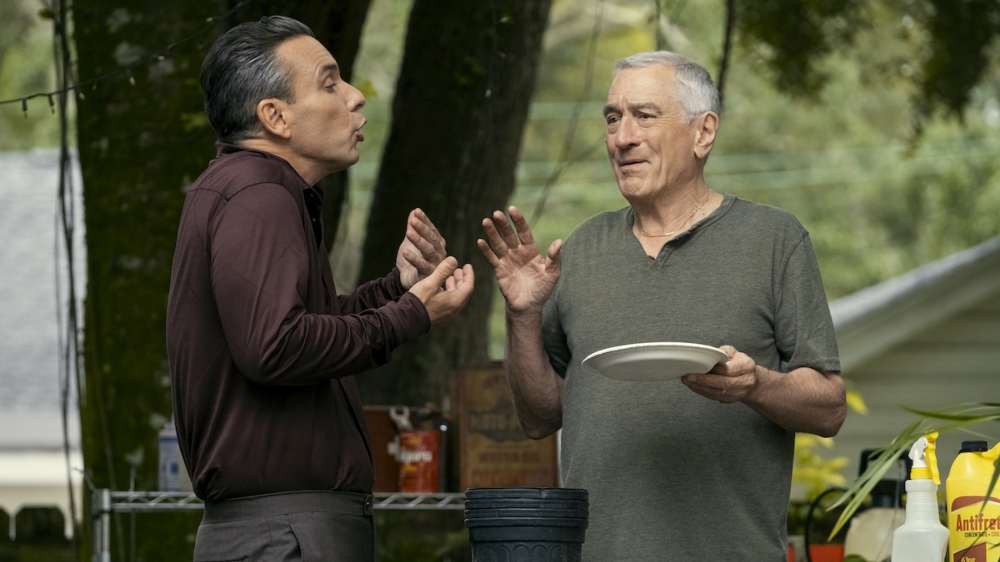
ATL: You used a lot of classic Italian arias for the music.
Terruso: I spoke with my mom, and I said, ‘Mom, send me a playlist of all the music that you listened to growing up, just stuff that’s personal to you.’ I grew up with Andrea Bocelli constantly playing in the house at dinner — the ultimate immigrant anthem. For the tennis scene, that was a part of my pitch at the very beginning of the process. In the script, it says they played tennis, and Sebastian’s amazing. I want it to play to this number [the anthem]. I want it to be in slow motion. I had a vision for what that should look and feel like.
ATL: Who’s idea was it to wear the green tracksuit that rips away to tennis whites?
Terruso: That was our brilliant costume designer, Brenda Abbandandolo. She did a great job. The wardrobe was so good in this film, as was the production design by Javiera Varas. I had two amazing female department heads for costumes and production design. I had a vision of what I wanted it to look like. We knew that he was going to wear a tracksuit over the tennis whites, but once you hire collaborators and they get it, they understand what you’re going for, [and] we’re off to the races.
ATL: One of my favorite laugh-out-loud moments is the Hydro Flight scene. Was that really Sebastian doing the stunt?
Terruso: We shot the film in Mobile, Alabama. It was the fall, so it was very, very rainy, and we shot it on a river. We had a professional jet booter who was incredible, and he was the guy doing all the falling [into the water] stunts. Sebastian’s wife, Lana, wants me to note that that was not Sebastian’s buttock. Her term for Sebastian’s butt is “way cuter.” I haven’t seen Sebastian’s butt, so I can’t comment. She did want me to note that! So that scene was very tightly storyboarded. Water work is difficult, stunt work is difficult, and we weren’t really allowed to have Sebastian in the water. It all had to be done with face replacements on barges. It was a very complex scene to shoot.
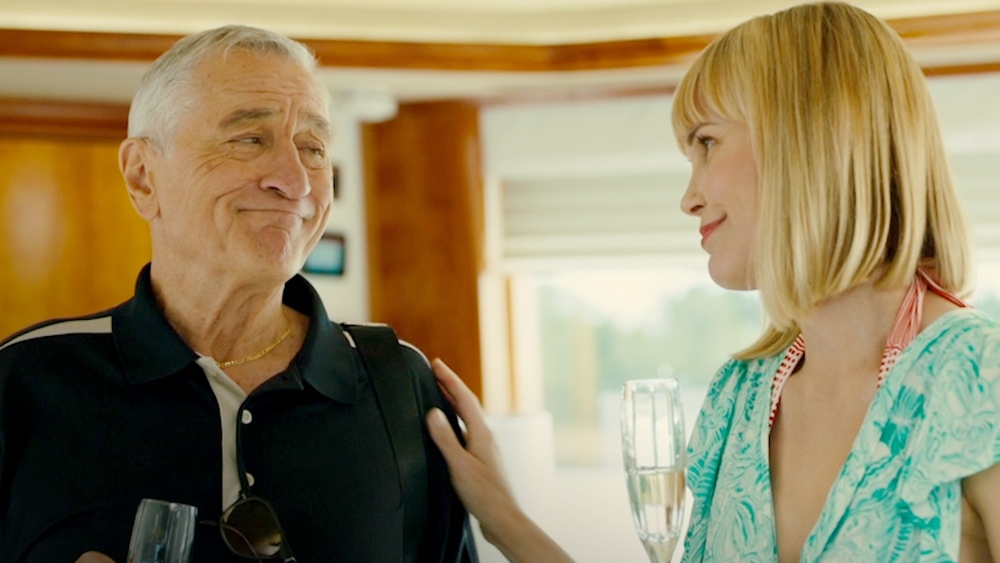
ATL: Did Leslie Bibb meet with Lana to discuss her character, who was based on her?
Terruso: Sebastian had met Leslie years before on a movie called Tag, and Leslie was the star of that. Sebastian and Leslie sort of knew each other, and their chemistry was just palpable from the first read. They read over Zoom, and it was kind of amazing in that she was so playful with him. When you see Lana and Sebastian, and then you see Leslie, they really are spiritually the right fit. They all knew each other, and Leslie was just an amazing partner for Sebastian throughout the whole shoot. She’s a wonderful comedian.
ATL: Was the description for her parents, played by Kim Cattrall and David Rasche, “waspy?”
Terruso: That was the idea, and that was all embedded in the dialogue and in the script. They just brought so much to it. Kim is one of the funniest actresses out there. It’s just such a joy to work with someone so grounded and committed. And she loved working with Bob. I think her scene with Bob in the salon is one of my favorite scenes in the movie. When he cuts her hair and they’re smoking cigars, it’s just fabulous.
[But] David Rasche was really the surprise, because on the page, that character didn’t have that much, and he improvised so much gold and brought so much humor. He’s a brilliant comedian. This is really an ensemble movie, and the cast is extraordinary. Everyone is at the top of their game, and everyone is bringing their A-game because they are all working with Robert De Niro. It was just such a pleasure to work with this cast, watch this cast work, and figure out the scenes with them and the blocking. That’s my favorite part of the whole process.
ATL: I don’t want to give away any spoilers, but I can say the family has peacocks roaming the grounds of their country house. Did you need a peacock wrangler on the set?
Terruso: We had a wrangler trainer. It’s funny because when we went to shoot that scene where the peacocks crossed the path, I thought, “There’s no way this is going to work. There’s no way these peacocks are not going to go all over the place, and we’re going to have to CGI this whole thing.” We roll the camera, and the peacocks just hit their marks every time. We were astounded. I think we got that in two takes and moved on. It was amazing. The peacocks strutted and did their stuff.
When I got to Mobile, Alabama, we started scouting all the local country clubs and found that the first week. We scouted a bunch of different houses, and when we found the house and I saw the room with the floral wallpaper, I said, ‘This is it. This is the house, and this is the room. This is where the guys are sleeping.’ That was the perfect room, with two twin beds.
ATL: Despite shooting in the south, did you at least have Italian food for the catering?
Terruso: There was a lot of southern food, actually. I remember my favorite meal being a New Orleans-like gumbo with all that kind of stuff and a lot of fish. But to be honest, this was a really tough shoot. We had 10-hour days with no lunches and rolling lunches, so a lot of times people would be eating next to the camera while trying to get other work done. We shot the whole movie in Mobile in 32 days with French hours, 10-hour days, and it rained. I would say 30 of the 32 days that we filmed there, [it] rained. It was hurricane season. We were there in September and October, and it was pretty miserable. The people are great. The locations were amazing. The food was awesome, but the weather was rough.
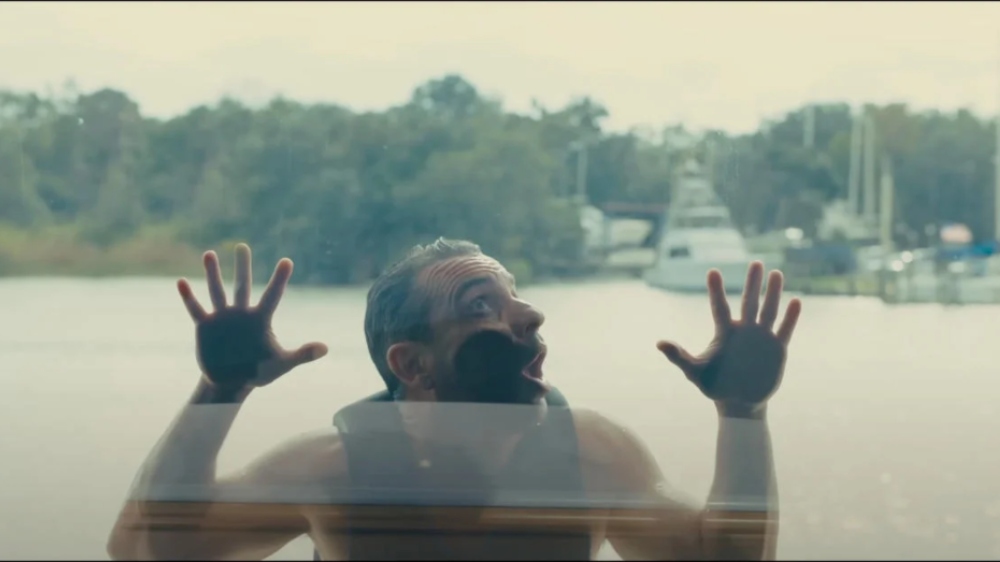
ATL: The two most important things for Italians are family and food. How was that discussed with regard to this film?
Terruso: I think all of that is just implied. We don’t talk about family or food. It’s a part of our culture, so it wasn’t something that we actively talked about, but it was obviously infused in the movie in such a beautiful way. It’s such a testament to Austen Earl and Sebastian’s writing that the story was so strong. The emotions of it and capturing that primal relationship between a father and a son were so real and authentic.
ATL: Most importantly, what did your Sicilian mom think of the film and what did she think about you working with De Niro?
Terruso: She loved it. She still can’t believe that she got to meet De Niro. This is a full circle for me. I don’t know that she was thrilled that I went to film school. No one in my family is a filmmaker. I grew up in Brooklyn, and my parents are like, “Get a steady, stable job.” Here I am living the filmmaker life in L.A. I think I finally won her respect with this one. After I finished my director’s cut, I went to New York to screen the film for De Niro. He was like, ‘It’s a comedy; I want to see it with an audience, so get, like, 20 people to show up to my theater in Tribeca, and we’ll watch it.’
So I called my mom, who was an elementary school teacher. She actually taught ESL (English as a second language), which is very sweet because she learned English as a second language as a young person and then went on to teach English as a second language to young people, which I think is really beautiful. So I called her, and I was like, ‘Mom, call all your colleagues from school. I need 20 people.’ She invited all her friends, and nobody knows that De Niro is sitting in the back of the room. The lights go down, he joins me, we watch the film together, and then he slips out before the lights come back up.
When the lights came back up, everyone was saying, [in a Brooklyn accent] ‘That was great, Laura.’ These are like real Brooklyn people! I had a call on my cell phone, and it was Bob, and he said, ‘Come up to my office and bring your parents.’ I’m like, ‘Mom, Dad, we’ve got to go.’ So we go up to his office, and my dad shakes his hand, and he is like, ‘I’ve always wanted to meet the “Godfather.”‘ It was hilarious. We talked about the movie a little bit. We talked about the music, and then I was like, ‘Ok guys, Bob and I are going to just touch base, and I’ll meet you downstairs.’ And my mom was like, ‘Wait, I have something to say.’ And I’m like, “Oh my God, what is she going to say?!” Then she went on to compliment his Sicilian accent in The Godfather Part II.
ATL: What do you ultimately feel are the main themes of this film?
Terruso: It’s a film about family. It’s a film about our parents and how everyone is embarrassed by their parents and every parent is embarrassed by their child. It’s just something about that primal connection that we have. I want people to laugh throughout and then cry at the end because ultimately, this is a heartfelt comedy, and I hope people leave the theater and call their dad or just hold their families a little closer. It’s really a film that celebrates family and our relationships with our parents.
About My Father is now playing in theaters nationwide courtesy of Lionsgate.


